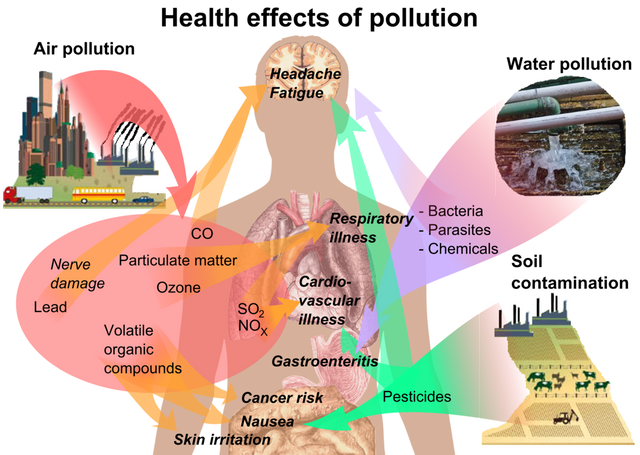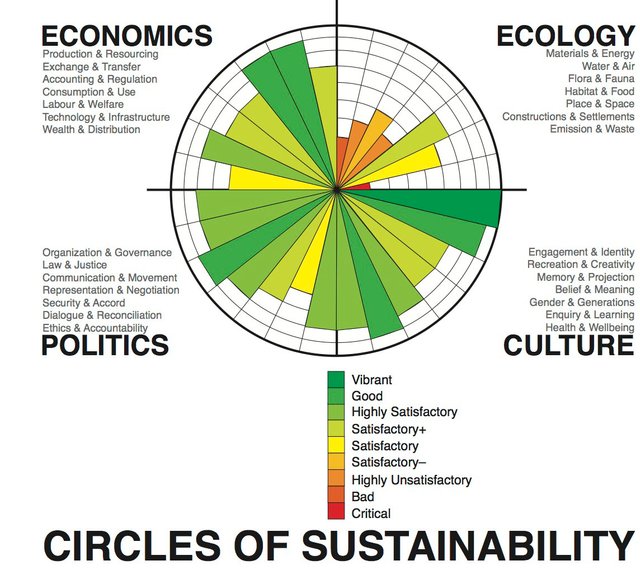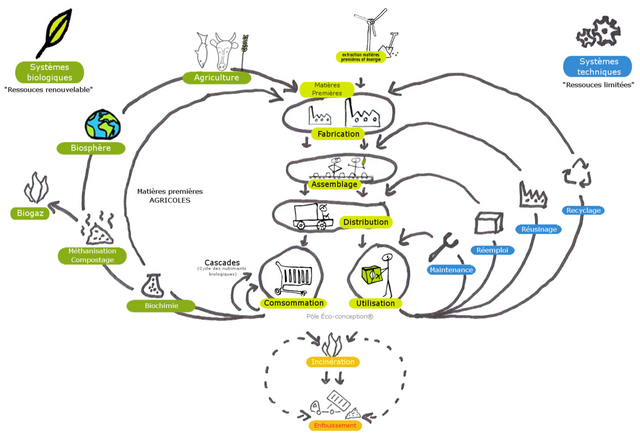
Diagram shows the ecological and biological relationships between human illness and environmental pollutants. For reuse, from wikipedia.
According to the World Health Organization, depression is now one of the most common health burdens in the world today, next to cardio vascular disorders and cancer. Major depression is a persistent severe condition and a very costly disorder in terms of lost efficiency at work, industrial accidents, high demand of bed use in hospitals, expense of treatment, state benefits, and personal suffering. Another alarming statistic from WHO is that up to 1 million people commit suicide annually, (Solomon et al., 2000).
Most qualified therapists who treat depression are not in a position to admit that yes we do in fact live in a depressing world, some might secretly share that opinion but their function is to focus on diagnosing imbalanced mental and emotional states and getting the patient to become more in touch with their truer feelings, to facilitate supporting them and treating them to be able to function again in the everyday world.
After a century of scientific research, there is actually no conclusive evidence of one single cause of depression and there are no single biological tests that can be taken to diagnose depression, therefore psychiatrists rely on non-specific forms and symptoms such as fatigue, hopelessness, problems sleeping and anxiety, but only some psychiatrists who have an in depth knowledge of immunology are aware that problems with the immune system plays a large role in affecting brain chemistry as well as body chemistry, in this way we can see how diet and environmental pollution can affect depression on a biological level.

Image courtesy of Pexel's free images.
The degree of depression also depends on the individual’s history, biological profile and environmental and circumstantial factors, there is also a growing body of scientific research in journals published since the early 1990s that shows depression is correlated with immune system activity, which is responsible for the production of cytokines which influence brain function, if there are problems with the immune system, this usually causes chemical imbalances in the brain. Lymph cells can also be found in the brain, in addition to the gut being the largest area that also serves as part of the immune system, therefore, if you do suffer from depression it would also be beneficial for you to make some lifestyle changes especially with eating habits to help boost your immune system.
The Western view of treating mental illness as a separate issue from everything else that is going on in the body is slowly changing over the last 20 years as scientists start to understand that the immune system greatly influences the brain chemistry and the immune system is affected by environmental factors. In Eastern medicine, the brain and the body are not separated in medicine and treatment is more holistic and successful.

Crop spraying. For reuse from wikipedia.
The increased level of air pollution and toxins in our food and water are also a sign that Western society would benefit from becoming more holistic and sustainable. We are our environment, physically and mentally, and if we already treat the environment like a dumping ground, how does this reflect our current state of consciousness, let alone our physical health? It is no wonder the rise in cancer and autoimmune illnesses are so high, we treat the environment like one big open garbage can and experimental laboratory.
At the peak of a technical boom, in a time when we have more wealth controlled by 1 percent of the elite, we also have more poverty. It feels like there is no such thing as homogenized progress in what we call civilization, most progress we have made is only with technology and not much of that is being used to help the problems of the planet, it’s mainly being used to control humanity or experiment with the fabric of time and space.
Anyone that is not deeply saddened by current global events are either in denial or very disconnected from the Earth and their true nature. It’s actually a sign of a healthily functioning human being, to be depressed in such times, it shows awareness and caring. The problem is that the undiagnosed mental illness of psychopathy and denial (of people in government and of people that hold positions of power), accompanied by an obsession with making money and controlling humanity as a priority above the cost of nature, ecocide, human life, the suffering of others and species extinction. It appears at times that to be in a position of power, the main qualification is a lack of sentience, empathy and complete disregard for nature accompanied by greed for money.

Warsaw, Poland, courtesy of pixabay.
There are wonderful things that capitalism has done for people, independent artists and musicians, technological developments, innovations and pioneers, but we also need to apply innovation and change to societies systems to develop more holistic and environmentally friendly ones, because society currently has a toxic and predatory nature that we could do without in modern capitalism This has created our collective dysfunctional ideas and beliefs about ourselves in relation to nature and other species in the human unconscious. There is a great deal of ecological ignorance and misunderstanding of environmental science, if we were all well informed, I doubt we would be in such an environmental crisis.
In some approaches to treating and understanding depression relating to Cognitive Behavioural Therapy and Gestalt Therapy, depression is understood as an adaptive process to a stressful environment, in most cases the patient has withdrawn themselves in various ways from engaging in a world, (a world that is rather malfunctional).
I personally like Jeff Foster’s view on depression which is the need for the individual to conserve energy, to withdraw and take a deep rest. The only problem is we also need to function in order to work, pay our bills and keep up with the rent, but we cannot argue with the subconscious needs and sometimes, that takes a higher priority so we have to figure out ways to see that depression is our inner selves requiring more indepth self awareness, holistic healing and strengthening of the body and mind in order to regain function in the world.

Illustration from pixabay for reuse.
Ecologists look at different biological and abiotic systems mainly related to ecosystems and how they work in relation to one another and if one becomes dysfunctional how that affects other ecosystems and species. From a deep ecological perspective depression is an indication that human understanding of itself in relation to the natural world, needs to change, since we lack respect for our environment and are polluting it at alarming rates, it is no wonder that autoimmune diseases and depression has risen statistically with industrial and technological development developing more toxic chemicals and pollution.
Though the academic books, journals and no doctor will ever diagnose a single cause of depression, immunology has identified that the immune system is a big factor and since the gastrointestinal tract is the largest immune organ in the body exposed to pathogens, from what we put into our body, we need to take into account that environmental pollutants, and chemical toxicity in our food can cause autoimmune problems too. This in turn causes other symptoms of an over active immune system and depression is a product of biological symptoms related to these factors, therefore a healthy external environment would reduce these influences and biological factors that can influence the rise in depression globally too. Most people do not connect the increase in external pollution, chemicals in water and food as an additional cause to the global rise in depression but we are our environment and this is one indication of this fact. We have actually gone over the limit of environmental and industrial pollution from pesticides and industrial waste so that even places where organic food is grown is still at risk of some sort of soil, air, or water contamination that affects our food sources and therefore our internal biological and mental ecology, which are showing detrimental signs of this pollution and disjointed what of thinking and treating the environment, with no thought of how it will eventually affect our own health.
Some people refer to depression as a 'disease'. It is not a disease, but a result of a chemical and emotional imbalance of the brain and body, normally affected by long-term stress, deep trauma or grief and a bad diet, in addition to external environmental factors such as food and water sources being contaminated by environmental pollutants and ingested; causing autoimmune illnesses which is an unaccounted factor in the global rise in depression and depression related illnesses. In most large urban cities there is often a problem with air pollution, in 2011, studies were done on mice exposed to air pollution and this caused inflammation in the hippocampus, learning problems and symptoms associated with depression, (Aaron J. Cohen et al 2006.)
The global rise in depression is a biological and mental reaction to industry and technology polluting the environment and therefore polluting our bodies and minds. When we separate ourselves from nature mentally, we separate ourselves from the ability to find that place to feel safe in nature, this is a magical thing because it’s feeling at one with the Earth, at peace in nature, one of the best feelings in the world. Edward Wilson wrote a book examining the relationship between our well-being with our relationship with nature in his book ´´The Biophilia Hypothesis´´. There is a growing body of theoretical and empirical work on the effects of environmental degradation and people’s happiness and health. One paper found that using log-linear methods for the panel of 21 countries for the period 1970-2005, that environmental degradation matters for the happiness of the people, and as environment degradation increases, their happiness decreases. Further, economic growth is found to have a positive and significant impact on the happiness of the people, whereas wage inequality and cost of living had a negative and significant impact, (Aviral Tiwari, 2011).

Diagram showing aspects of society that could be imporved by sustainability via wikipedia for resuse.
Modern ecological economics has also proven the traditional assumptions that the level of consumption of market goods and GDP is a close approximation to a social welfare function, put simply, human happiness and well-being does not correlate with material wealth. Even the most conservative interpretations of the relationship between income and well-being indicate that well-being is not determined by consumption alone, (Blanchflower and Oswald, 2004; Keely, 2005). Another interesting aspect of human well-being and environmental well-being, is the emotional effect of learning about species loss and environmental degradation on a person’s mental well-being are clearly detrimental to a person’s mental health. Scientists Gowdy and Carbonell, (2007), set up an empirical testing of E.O. Wilson's Biophilia Hypothesis. The results were astounding, 85% of their participants reported concern about animal extinction. There is a relationship between human well-being and attitudes towards' pollution and species loss and that it is not only pollution that negatively affects individual's well-being but the human preoccupation of the impact of pollution on species loss, concern with biodiversity loss is a sign of caring about the living world. Individuals that care about biodiversity loss are believed to reveal a psychological connection with other living organisms.
Therefore, the positive relationship between well-being and concern about species extinction lends support to those who argue that humans receive positive psychological benefits from caring about other species, (Aviral Tiwari, 2011), (Kellert and Wilson, 1993). This is a very interesting study and gives those of us already deeply concerned about the state of the planet some hope, the importance of environmental awareness to human well-being shows that we do in fact get depressed if we know the environment is being destroyed, the effect that environmental concern has on an individual’s well-being. A priori, one may expect that any environmental concern would negatively affect an individual's well-being. Gowdy and Carbonell, (2007), concluded that showing positive concern about nature, landscapes, interaction with plants and wildlife, is positively connected with human well-being, while the opposite is true for showing concern about negative environmental features (e.g. pollution). Therefore in addition to us actually getting physically sick and depressed if our environment is polluted, most of us get depressed just worrying about the state of the environment.

Diagram demonstrating a more holistic circular economy better for humans and the environment. Courtesy of Ellen MacArthur Foundation, reuse permitted.
The global economic systems would benefit from integrating ecological concepts into the economy and society, but prefer to ignore this vital necessity if we are to live sustainably and fairly on this one and only Earth. There is one country in the world that understands this spiritually and practically, in the 1970s, the king of Bhutan announced that the happiness of the population was more important than Gross Domestic Product. Bhutan is leading humanity as the world’s first completely 100 per cent organic country with its agricultural practices and instead of measuring the country’s Gross National Product, (GNP), it puts emphasis and value on Bhutan’s Gross National Happiness (GNH) of its society, spiritual culture and people. Dr. Saamdu Chetri who endorsed my last book The Silent Ecocide, has been charged with this mission and responsibility for Bhutan and he set up the Center for Gross National Happiness in Bhutan to teach the world how to do this, integrating economy with ecology and spiritually and sustainability. Anyone can go and learn and partake in this innovative project for themselves and return to teach their own communities. I’m not suggesting Bhutan’s blueprint would work for every country or culture but it is certainly a courageous example of pioneering approaches to intentionally change our values to those that are less destructive and healthier for the individual and communities for the route humanity needs to take in order to step out of this crisis.
The corporatization of the political world has become unethical and careless, ignoring its responsibility to protect the planet and now this is reflected in the growing millions of depressed people across the planet, it is no surprise that over 1 million people have been reported to commit suicide per year, a very sure sign that things need to change at the very core of human society to integrate more ecological and holistic approaches to human health and happiness by improving the levels of environmental health and living closer to nature and integrating a more sustainable economy to ensure better future for humanity and the Earth.
by Carlita Shaw
Article inspired by her new book Surviving Depression in Depressing World due to be published in a few months.
#psychology #depression #nature #health
Further research
Aaron J. Cohen, H. Ross Anderson Bart Ostra, Kiran Dev Pandey, Michal Krzyzanowski, Nino Künzli, Kersten Gutschmidt, Arden Pope, Isabelle Romieu, Jonathan M. Samet, Kirk Smit 2006. The Global Burden of Disease due to Environmental Pollution. Journal of Toxicology and Environmental Health, Part A 1 Sep 2006
C. Arden Pope III and Douglas W. Dockery, Health Effects of Fine Particulate Air Pollution: Lines that Connect. Journal of the Air & Waste Management Association Vol. 56, Iss. 6, 2006
Aviral Kumar Tiwari. Happiness and Environmental Degradation: What Determines Happiness? Volume 31, Issue 4 Nov 22. 2011. Economics Bulletin
David G. Blanchflower and Andrew J.Oswald, Well-being over time in Britain and the USA 2004. Journal of Public Economics 88 (2004) 1359–1386
Ada Ferrer-i-Carbonell and John Gowdy. Environmental degradation and happiness. Ecological Economics, 2007, vol. 60, issue 3, pages 509-516.
Edward O. Wilson and Stephen R. Kellert, The Biophilia Hypothesis. Island Press. 1995
D.A.Solomon, M.B.Keller, A.C.Leon, J.Endicott., March 2000, Multiple recurrences of major depression. American Journal of Psychiatry 157(2):229-33 ·

Love your work
Downvoting a post can decrease pending rewards and make it less visible. Common reasons:
Submit
Thank you for the support, deeply appreciated!
Downvoting a post can decrease pending rewards and make it less visible. Common reasons:
Submit